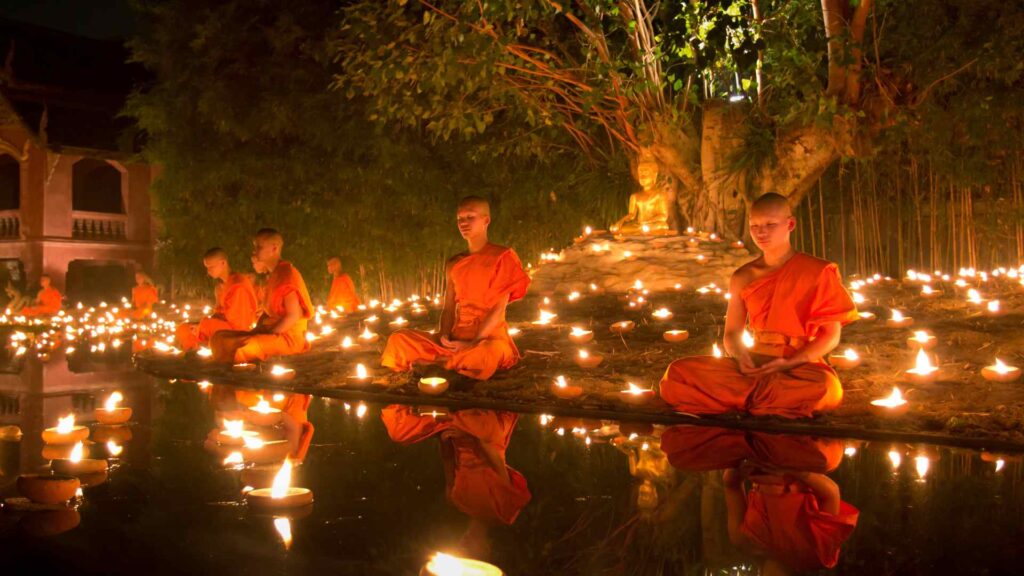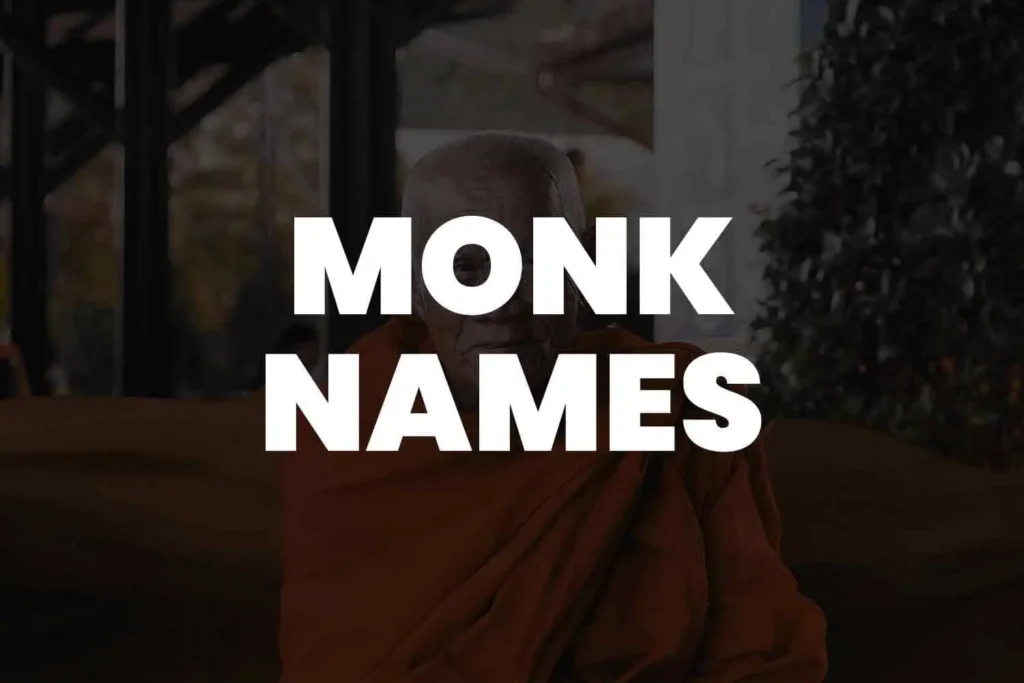Monks, revered for their devotion, discipline, and spiritual wisdom, often carry names that reflect their inner journey, cultural heritage, or religious path. The term “monk names” encompasses a wide variety of naming conventions across global religions—Buddhism, Christianity, Jainism, Hinduism, and others. These names are not merely identifiers but are deeply rooted in spiritual traditions, symbolizing a break from worldly attachments and an embrace of a higher purpose.
In this comprehensive article, we’ll explore the history, significance, structure, and examples of monk names across different cultures and religious paths. Whether you’re researching for spiritual reasons, writing, naming a character, or simply curious, this guide will offer rich and detailed insights.
What Are Monk Names?
Monk names refer to the names adopted or given to individuals who have taken monastic vows within religious orders. Unlike ordinary names, monk names often signify a person’s new spiritual identity. These names may be chosen by religious leaders, derived from sacred texts, or based on personal spiritual qualities.
Once a person becomes a monk, especially in traditions like Buddhism or Christianity, they often relinquish their birth name and adopt a name that reflects humility, devotion, or a specific religious role.
The Importance of Monk Names
Monk names serve several key purposes:
- Spiritual Rebirth: The new name signifies a rebirth or a new life devoted to spiritual practice.
- Detachment: Letting go of one’s birth name helps sever attachments to the ego and past life.
- Identity in Monastic Order: It reflects the lineage or order to which the monk belongs.
- Virtue and Aspiration: Many monk names reflect qualities such as wisdom, compassion, purity, or discipline.
Monk Names in Different Religious Traditions
Let’s take a look at how monk names differ across major world religions.
1. Buddhist Monk Names
In Buddhism, monk names are deeply symbolic and often given by a senior monk during ordination. These names are typically derived from Pali, Sanskrit, Chinese, or Tibetan languages, depending on the branch of Buddhism—Theravāda, Mahāyāna, or Vajrayāna.
Structure:
- Usually two parts, often signifying qualities such as “Wisdom,” “Compassion,” or “Peace.”
- May include a reference to Buddha, Dharma, or Sangha.
Examples:
- Ajahn Chah – Thai monk; “Ajahn” is a title meaning “teacher.”
- Thích Nhất Hạnh – “Thích” is a Vietnamese surname for monks, meaning “of the Shakya (Buddha’s) clan.”
- Tenzin Gyatso – “Tenzin” means “holder of teachings”; the name of the 14th Dalai Lama.
2. Christian Monk Names
Christian monks, particularly in Catholic, Eastern Orthodox, and Anglican traditions, often adopt a saint’s name or a name associated with a biblical figure. This practice dates back centuries and reflects the monk’s devotion to emulate that saint’s life.
Structure:
- Single names (e.g., Brother Anthony, Father Benedict).
- Sometimes combined with titles like “Brother,” “Father,” or “Friar.”
Examples:
- Brother Lawrence – Known for “The Practice of the Presence of God.”
- Saint Benedict – Founder of Western monasticism; many monks take his name.
- Father Seraphim Rose – American Orthodox monk who took a new name after tonsure.
3. Hindu Monk Names (Sannyasis)

In Hinduism, monks or sannyasis often receive new names during their initiation into spiritual life. These names usually have meanings connected to divine attributes, detachment, or devotion.
Structure:
- Includes a personal name followed by a monastic title or suffix like “Ananda,” “Saraswati,” “Giri,” or “Bharati.”
- The full monk name may indicate the lineage (Dashanami order, for example).
Examples:
- Swami Vivekananda – “Vivekananda” means “bliss of discrimination (spiritual insight).”
- Swami Sivananda – “Sivananda” means “bliss of Shiva.”
- Swami Prabhupada – Founder of ISKCON; “Prabhupada” is a respectful title.
4. Jain Monk Names
In Jainism, monks are given names by their spiritual teachers. The names often reflect detachment, knowledge, and non-violence. Jain monk names are typically in Sanskrit or Prakrit.
Structure:
- Often end in “Suri” (e.g., Acharya Hemachandra Suri).
- Reflect philosophical or doctrinal aspects of Jainism.
Examples:
- Acharya Vidyananda – A prominent Digambara monk.
- Shantisagar – “Ocean of Peace,” an influential 20th-century Digambara monk.
5. Shaolin and Taoist Monk Names
In Chinese monastic traditions, particularly in Shaolin Buddhism or Taoism, names are given based on lineage and spiritual aspirations. In Shaolin tradition, the generation name (like “Shi” or “Xing”) shows the lineage.
Structure:
- Typically two-syllable names; first denotes generation, second is personal or spiritual.
- “Shi” (釋) for Buddhist monks; “Dao” (道) for Taoist monks.
Examples:
- Shi Yongxin – Abbot of the Shaolin Temple.
- Dao Zhen – A Taoist monk; “Zhen” means “truth” or “authentic.”
Modern Uses of Monk Names
Today, monk names are not only used in monastic communities but are also widely recognized in literature, film, video games, and spiritual circles. People adopting minimalistic lifestyles or entering new age spiritual paths may choose monk-inspired names as a symbol of transformation.
Famous Monk Names in Pop Culture
- Master Oogway (Kung Fu Panda) – Inspired by Taoist traditions.
- Monk Gyatso (Avatar: The Last Airbender) – A wise airbending master.
- Brother Tuck (Robin Hood) – A jolly Christian friar.
- Shaolin Monks in games like “Mortal Kombat” – Reflecting martial spirituality.
These names often inspire strength, wisdom, and inner peace in audiences.
How to Choose or Create a Monk Name
If you are interested in adopting a monk name for spiritual or creative purposes, consider the following steps:
- Understand Your Purpose: Is it for a religious vow, storytelling, or personal growth?
- Research Tradition: Different religions have specific naming rules and spiritual significance.
- Pick Meaningful Words: Choose names that reflect virtues like compassion, detachment, wisdom, or strength.
- Consult a Teacher or Elder: Especially important in genuine spiritual paths.
- Keep It Simple and Reverent: A name should resonate with peace and humility.
Conclusion
Monk names hold deep spiritual, cultural, and personal significance across a wide spectrum of religious traditions. Far more than just labels, these names are symbolic of a monk’s transformation, inner qualities, and religious affiliation. Whether rooted in centuries-old languages or inspired by modern interpretations, monk names continue to inspire a sense of peace, detachment, discipline, and spiritual wisdom.
If you’re seeking a monk name—either for spiritual awakening, literature, or personal identity—remember that each name carries a powerful legacy. Choose or use it with intention, respect, and understanding.
FAQs
Q1: Can anyone choose a monk name for themselves?
A: Traditionally, monk names are given by spiritual teachers during formal initiation. However, in modern or non-traditional contexts (like storytelling or spiritual exploration), individuals may choose a name that resonates with their personal journey.
Q2: What are common prefixes in Buddhist monk names?
A: “Ajahn” (teacher), “Thích” (Vietnamese for Shakya), “Tenzin,” “Bhikkhu,” and “Lama” are commonly used prefixes or titles in different Buddhist cultures.
Q3: Are monk names always in ancient languages?
A: Often, yes. Names are typically in Pali, Sanskrit, Latin, or Classical Chinese. However, modern names may blend old and new elements.
Q4: Can women have monk names?
A: Absolutely. Female monastics (nuns) also receive spiritual names, like “Bhikkhuni” in Buddhism or “Mother Teresa” in Christianity.
Q5: Do monk names have legal implications?
A: In many monastic orders, the name is used spiritually and socially, but monks often keep their legal names for official documentation unless they change it formally.
Also read: Steps for a Skincare Routine



Pingback: Xabi Alonso: A Maestro on the Pitch and the Touchline - NYWeeklys